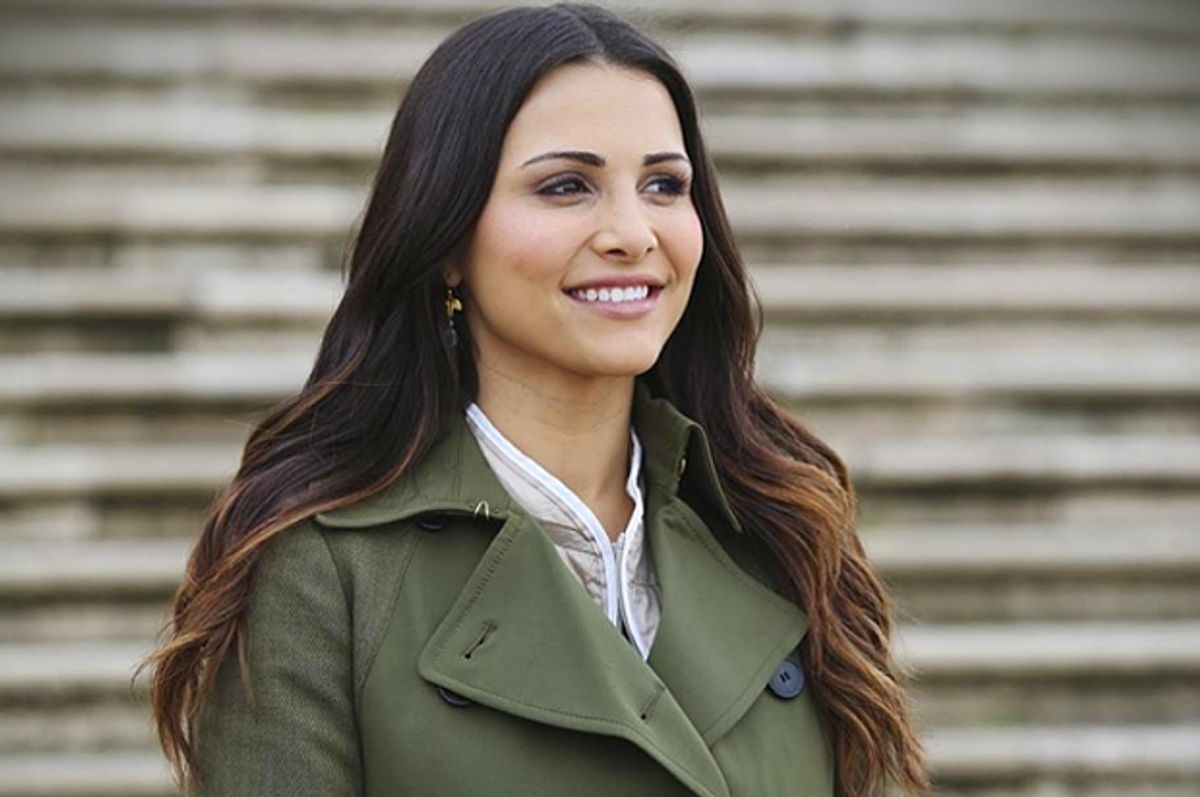This season of "The Bachelorette" has been an extended pitch for the ball-busting careerism of newly minted starlet Andi Dorfman, an assistant district attorney in Atlanta who has repeatedly told us how much she "loves her job." After opting to leave the most recent season of "The Bachelor" rather then continue to pursue caddish suitor Juan Pablo Galavis, Dorfman was announced as the future bachelorette with stagey shots of her walking down a hallway, or chatting while holding sheafs of paper -- basically Aaron Sorkin's idea of a "professional lady." In promos, she was shot from below in front of an Atlanta courthouse, looming like Lady Justice herself.
"I prosecute anything that's gang-related," Dorfman says in voice-over in one episode, sliding into a black SUV with a colleague and declaring "Let's hit it!" She was depicted in stark opposition to human mannequin Galavis, a retired soccer pro whose rarely mentioned job was vaguely related to a Venezuelan sports museum.
Sadly for her colleagues but happily, perhaps, for Atlanta's gang members, Dorfman's workdays are over (at least for now). The Atlanta Journal-Constitution reported this week that Dorfman has departed the Fulton County district attorney's office after an initial three-month leave of absence. In her resignation letter, Dorfman suggested she might like to continue working after her obligations to ABC are concluded, "by year's end" -- but for now, at least, she was quitting.
It's rare that the reality of work intrudes on the world of the "Bachelor" franchise, but it's happened before: Ali Fedotowsky, competing for the heart of Bachelor Jake Pavelka in 2010, decided to leave the show when her vacation days ran out.
But then the plot took a more predictable turn: Ali liked television so much that she ended up quitting her job -- at a pre-IPO Facebook -- in order to appear as "The Bachelorette." (She also called Jake Pavelka later in his "Bachelor" season and asked if she could come back; he declined.) She didn't find love, but she's sustained a career as an entertainment personality, most recently on "E! News." The list of Bachelors and Bachelorettes are full of people whose jobs are either impossible to parse or simply not real -- "retired athlete," "dog lover," "pro bass fisherman," "pantsapreneur."
Jobs are used as signifiers of personality or type -- sort of like a Myers-Briggs test. And needless to say, this is a self-selecting group; it's the rare job that would allow an employee to take months off at a time. Pavelka, whose life as a commercial pilot was seen as glamorous enough to lend his season the subtitle "On the Wings of Love," cared little enough about it that he stowed his pilot's cap when it seemed he might become a successful Hollywood actor. And when that dried up, he took to the skies again.
"The Bachelor" uses its contestants' careers the way most TV dramas use costuming. In the Juan Pablo season, Andi Dorfman was introduced as a tough-as-nails A.D.A. so that we could understand her as a character through that lens: her no-nonsense straight-talk would seem typical, and seeing her succumb to emotion would seem extraordinary. But by and large -- needless to say -- the conversations we see on "The Bachelor/ette" are never about work, which is what normal people talk about on dates. Instead we see them discussing studiously vague stuff about "the future" and "destiny." The "Bachelor" franchise never felt more transparent than it did in the Juan Pablo season, when the show pretty much coughed into its hand and shrugged whenever someone raised the subject of what its retired soccer player was up to these days. Being upfront about not being motivated by work was the most revealing thing Juan Pablo did.
Dorfman's decision to leave the job she'd told us she loved was a strange (if ultimately unsurprising) moment in "Bachelor" history because of just how relentlessly and blatantly ABC had pitched has a career woman. And it's worth noting that her job was foregrounded much more in "The Bachelor" than it has been thus far in "The Bachelorette." The message seems clear: that her career was useful as a distinguishing feature while she was fending off romantic competitors, but less so when was already established as the show's prize. So much less so, in fact, that she quit.



Shares